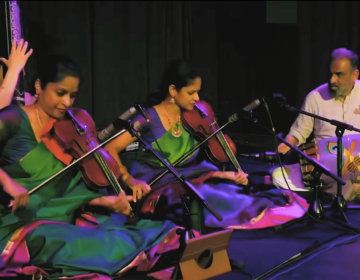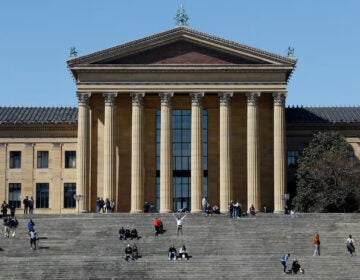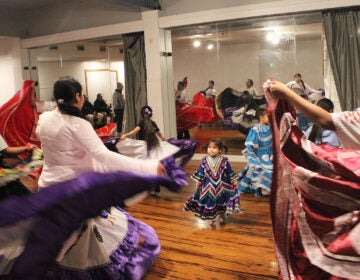Bayard Rustin: the architect of the March on Washington you may have never heard of
Most everyone knows Martin Luther King’s iconic “I Have a Dream” speech. But few people know about the West Chester native who was the architect of the March on Washington where King delivered that speech. Now, the Chester County Historical Society is celebrating that native son, Bayard Rustin. As you walk down the picturesque streets of West Chester today, it’s hard to believe the town once was the site of its own civil rights lunch counter protest.
“It was a segregated community,” said Ellen Endslow, the Director of Exhibits at the Chester County Historical Society. She recounts how the civil rights leader Bayard Rustin protested discrimination even as a high school student during the Depression.
“So there were restaurants in West Chester where black people just knew they weren’t going to go, because they would not be served,” said Endslow. “Someone who was visiting the other day quoted the story about his father going with Rustin to a restaurant. And they went in and sat down at the restaurant tables and no one served them. And the whole idea was, Rustin was doing it on purpose. He wanted to see what would happen. He wanted to create a multicultural environment in the community and he knew that one person could make, could start making a difference, even if it didn’t change anything right away.”
Then, this sort of segregation was the norm for most towns. In West Chester, a strong Quaker influence tempered the restrictions on African Americans, but created inconsistencies.
“You just knew where to go and where not to go [laughs]. That’s the way it was,” said Gregory Porter. He shows a photo of his father’s integrated track team at West Chester High School in 1932.
“That’s Bayard Rustin on the right and my father on the left. This is the mile relay team from West Chester High School in 1932,” said Porter.
“Bayard Rustin and my father Charles Porter did have an incident related to this track team,” he said. “They were on their way to Allentown, to go in the state finals. Coach Zimmerman said, when we get up to Allentown to the hotel, I want the white boys to take their bags and go into the hotel lobby. The colored boys, stay on the bus, because you’re going to go to a church where they’ll find people, church members, to put you up in their homes. Somewhere between when the coach made that statement and they arrived at the hotel, they told the coach, if we can’t stay together, we’re not going to run together.”
Those early actions set a pattern for Rustin’s life. His Quaker roots instilled both a strong sense of social justice and nonviolence in him, which he passed on to the nascent civil rights movement in the 1950s. Now, the Chester County Historical Society is commemorating the centennial of Bayard Rustin’s birth.
“We want people to know that he was from Chester County,” said Endslow. She helped assemble an exhibit that highlights Bayard Rustin’s West Chester roots.
“What makes Chester County unique is its Quaker background,” said Endslow. “The Quaker idea of allowing all people to achieve what they could do. And we wanted to talk a little bit about where his ideas came from, in order for him to develop the activism and the procedures and the nonviolent approach that became the hallmark of the civil rights movement. Look at photos of Marin Luther King Jr. and chances are, right behind him you’ll see a tall black man with a bristly crew cut and an intense look on his long face. Why was Bayard Rustin always in the background? He was intelligent, passionate and well-spoken. He was also gay, and for a short time, a member of the Communist Party, two factors which relegated him to a behind-the-scenes role in the civil rights movement. His name still can stir controversy, as when the West Chester School District dedicated a new high school after him in 2006.
“There were several people, deceased, noteworthy people who had had an impact on the world, who were from West Chester, and Rustin was at the top of the list,” said Endslow. “There were people who were very upset to consider someone who had been a Communist for a few years and others were concerned that he was homosexual. No one spoke too much about his race.”
The historical society has planned several events around the exhibit, including a walking tour of Rustin sites in West Chester, and a showing of the documentary film about Rustin, “Brother Outsider.” The opening event on March 3rd will feature a talk by Reverend Anderson Porter, who organized the Chester County participants in the March on Washington. The West Chester Gospel Choir will perform tunes that Rustin himself, an accomplished musician, loved to sing. “Bayard Rustin: Local Roots” will be on exhibit at the Chester County Historical Society through the end of May. A permanent version of the exhibit will be installed at the Charles Melton Community Center, in West Chester.
WHYY is your source for fact-based, in-depth journalism and information. As a nonprofit organization, we rely on financial support from readers like you. Please give today.




